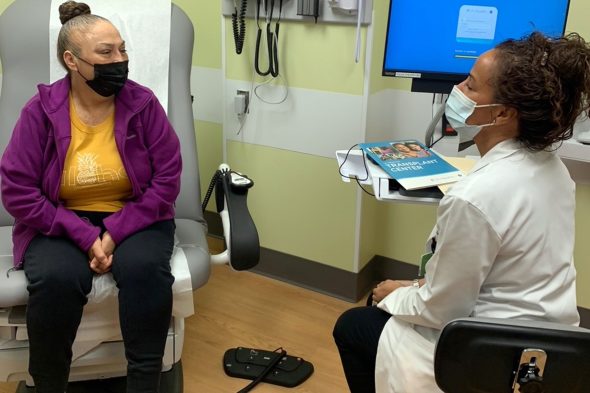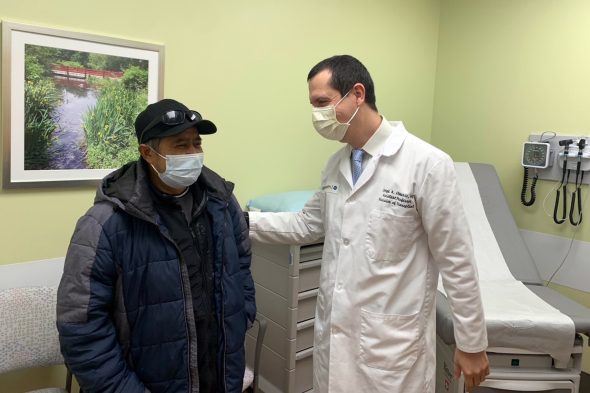UI Health’s clinic aids Spanish speakers seeking kidney transplants

For several years, Andrea Barcenas struggled to organize her work schedule around attending medical appointments with her mother, Juana Garcia, and serving as Garcia’s interpreter.
During each appointment, Barcenas would relay in Spanish the important information doctors were providing to her mother in English. When Barcenas couldn’t make it to the appointment, she was left hoping Garcia accurately understood what the doctor was saying.
En español
At a recent medical appointment, doctors shared the news that Garcia would need a kidney transplant. Barcenas worried that the long transplantation process would mean she would be struggling even more to make the medical appointments.
Barcenas’ worries were eased when, during a recent visit to Cook County Health, Garcia’s doctors told the family about the UI Health Kidney Transplant Program, which would evaluate her to see if she was eligible. They quickly switched hospitals when they were told that UI Health had a newly opened Spanish Language Clinic, where everyone would speak to Garcia in Spanish.
“It’s better for her to come here where they could explain everything to her in Spanish, and I don’t have to be translating,” Barcenas said.
At a recent visit to the clinic, which moved in September to the newly opened Specialty Care Building, Garcia easily listened as Karen Lostaunau, a pre-kidney transplant and living donor nurse coordinator, outlined in her native language a step-by-step roadmap of what the long process would entail.
Garcia said that meeting Lostaunau and learning about the Spanish Language Clinic has been a very good thing because it gives her one less thing to worry about if her health continues to decline. Even seemingly minor issues like learning about upcoming medical tests and scheduling were often lost in translation if her daughter didn’t accompany her.
“When they talked to me in English, I had no idea what they were saying to me,” said Garcia, recalling prior appointments. “The minute I step into this clinic, they are speaking to me in Spanish, so I know right away what they are saying to me.”
Growing numbers
Since the Spanish Language Clinic began in April 2022, more than 160 patients have signed up with the clinic, which specifically treats Spanish-speaking patients on Tuesdays and Fridays, said Samantha Mok, transplant outreach coordinator at UI Health.
UI Health has a long history of treating Spanish-speaking patients and is the leading hospital to provide transplant services to this population, Mok said. The Affordable Care Act, coupled with changes to the Illinois Transplant Fund and Medicaid, eased regulations — allowing more transplant coverage regardless of citizenship status, Mok said.
With the changes and the growing numbers of Latino patients on transplant lists, UI Health officials decided that a clinic serving the population in their native language was due.
“The need arose to define this as a Spanish language clinic as well as for the quality of care that allows people to communicate with physicians in their first language,” Mok said. “When you can communicate with your physician in your first language, our stance is that your quality of care is going to be 10 times better as opposed to going through an interpreter or guessing.”

Dr. Jorge Almario Alvarez, physician surgeon at UI Health and assistant professor of clinical surgery in the College of Medicine, works in the Spanish Language Clinic. He said the entire team in the clinic speaks Spanish — the nurses and doctors, the nutritionists, the financial advisers and the social workers — so that evaluations of transplant candidates are done entirely in Spanish.
“When I see patients in the Spanish Language Clinic, we’re going to speak Spanish about the surgery and about the process. and we will all have a better understanding of what will happen,” said Almario, a native of Colombia. “One of the problems for Spanish speakers, when they come from another country and they don’t speak the language, is that everything is overwhelming, and they are scared that if they speak something bad is going to happen.”
Talking to doctors
Almario said the clinic is needed to make sure the patients are aware of and follow directions properly as they wait for a new kidney and to make sure they remain healthy once they have the new kidney. Often kidneys are harvested after someone has been left on life support or have been donated by a friend or family member of the patient.
“It is a real treasure that we appreciate enormously,” he said.
To get on the transplant list, patients need to be younger than 70 if they are receiving a kidney from an unknown donor. Patients older than 70 can still receive a transplant if they have a donor. The patient must also pass medical tests to make sure their bodies are healthy enough to tolerate the transplant, must have all their COVID-19 vaccines and cannot be on hard drugs, Mok said.
Jose Gomez heard about the clinic from his medical team at Cook County Health and said he was eager to get on the list for a kidney. He’s been having kidney problems for the past year and hasn’t been able to work because he must be on dialysis several times a week for several hours at a time.
“In the past when there hasn’t been anyone communicating in Spanish with me, I would get very confused because there are words in English I didn’t understand,” said Gomez, who is from Mexico. “It’s important to know what is being said, especially if it’s bad news.”
Faustina Reyes said that when she was told by her nephrologist at Cook County Health about the UI Health clinic where everyone spoke Spanish, it felt like it was “a blessing.” In the past, she would have to rely on her son to act as an interpreter, or she would have to try and make sense of what she was being told.
“I like that they speak to me in my native language, and we can understand each other very well and each of the questions that I have they answer them perfectly,” said Reyes, who is from Mexico. “I am so thankful that this clinic exists.”
More information about the UI Health Spanish Language Clinic is available on the UI Health website.
